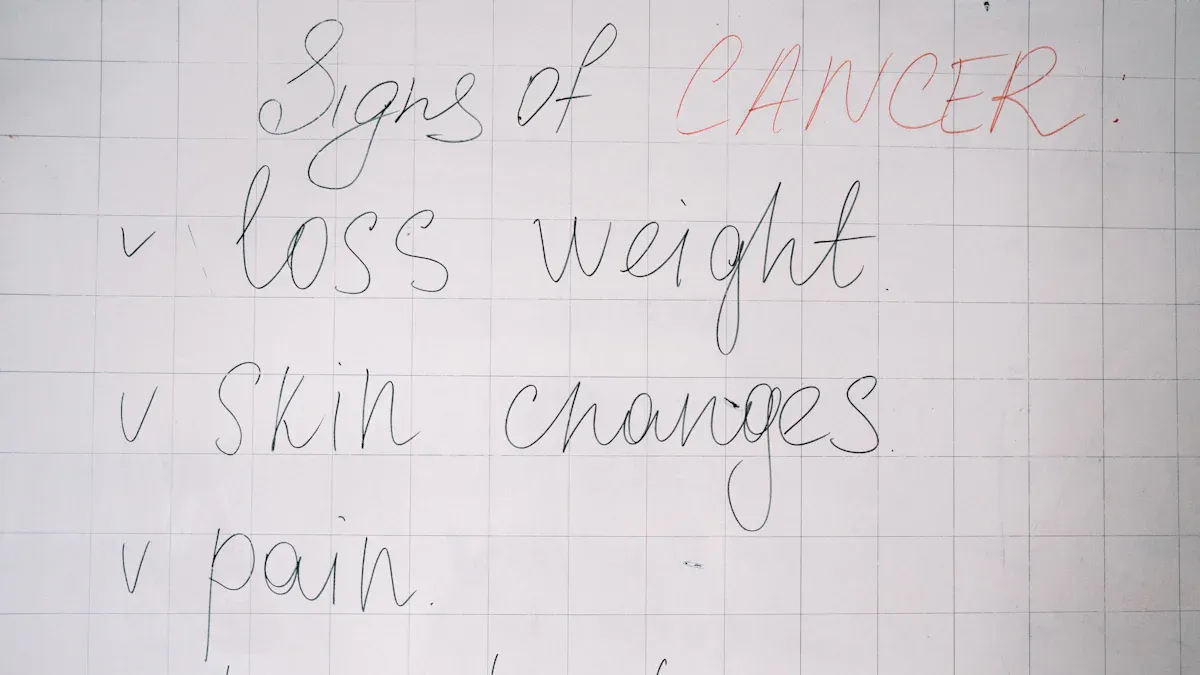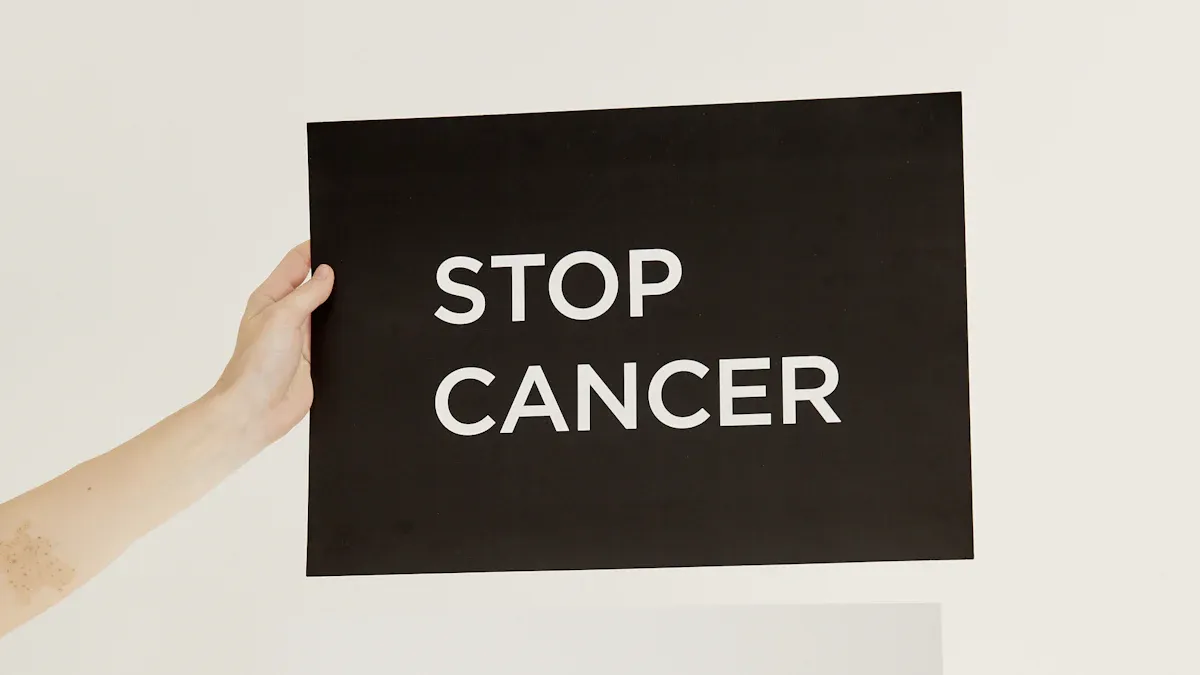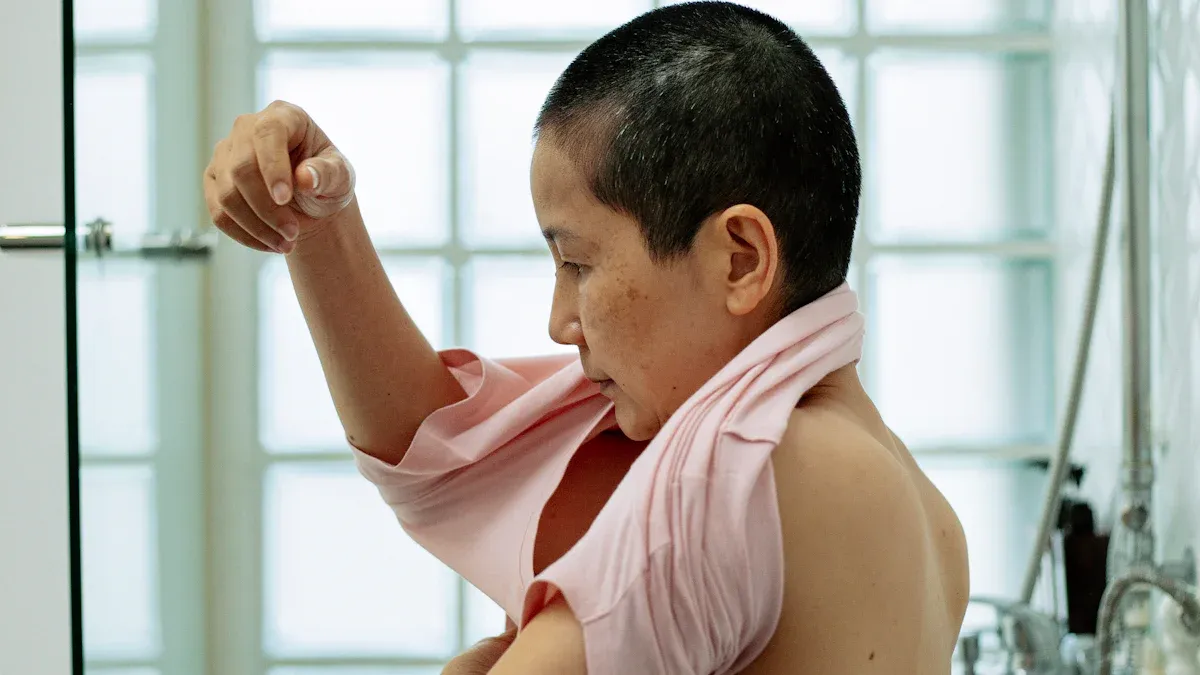Why Cancer Treatment Leads to Weight Loss

Cancer treatment often leads to significant weight loss, affecting your physical and emotional well-being. This happens due to a combination of factors. For example:
Over 80% of patients with pancreatic cancer experience unwanted weight loss.
Many cancer patients face unintentional weight loss caused by treatment side effects, emotional distress, and physical changes.
Addressing this issue early can help you maintain strength and improve your quality of life. If you’ve wondered, "Does Cancer Treatment Always Cause Extreme Weight Loss?" the answer depends on various factors, including the type of cancer and treatment.
Key Takeaways
Cancer treatment may lead to weight loss from side effects like feeling sick, losing appetite, or food tasting different.
Acting early is important. Noticing weight loss can help you stay healthy.
Eating foods with lots of calories and nutrients in small, frequent meals can help keep your weight steady.
Talking openly with your doctors helps you get the right support and meal plans.
Having family, friends, or support groups around can give you emotional and practical help during treatment.
Why Cancer Treatment Causes Weight Loss

Treatment Side Effects
Nausea and Vomiting
Cancer treatments like chemotherapy and immunotherapy often cause nausea and vomiting. These side effects make it difficult for you to eat or retain food, leading to unintentional weight loss. Studies show that nausea and vomiting are common after treatment sessions, significantly impacting your nutritional intake. For example, chemotherapy and radiation therapy frequently result in these symptoms, which can persist for hours or even days.
Appetite Loss
Loss of appetite is another common challenge during cancer treatment. You may find yourself eating less due to changes in your sense of taste or smell. Treatments like chemotherapy can alter how food tastes, making even your favorite meals unappealing. Additionally, early satiety, where you feel full after just a few bites, is a frequent issue. This can occur because cancer cells release hormones that disrupt hunger signals.
Changes in Taste and Smell
Cancer treatments can alter your taste buds and sense of smell. Foods may taste metallic, bitter, or bland, which can discourage you from eating. This change often leads to reduced calorie intake and, over time, weight loss. For many patients, these sensory changes are temporary, but they can still have a significant impact on your overall health during treatment.
Digestive Challenges
Difficulty Swallowing
Some cancer treatments cause mouth and throat sores, making it painful to swallow. This is especially common with chemotherapy. When eating becomes uncomfortable, you may avoid meals altogether, which can lead to malnutrition and weight loss.
Diarrhea or Constipation
Digestive issues like diarrhea or constipation are frequent side effects of cancer therapy. Chronic diarrhea, in particular, can result in dehydration and nutrient loss, contributing to unintended weight loss. A study highlights that both chemotherapy and radiation therapy often cause these symptoms, further complicating your ability to maintain a healthy weight.
Increased Calorie Needs
Metabolic Changes During Treatment
Cancer and its treatments can increase your body's calorie needs. Cancer-related inflammation releases proteins that suppress appetite-stimulating hormones and disrupt your metabolism. This metabolic shift often leads to muscle and fat loss, even if your food intake remains the same. Research shows that malnutrition affects 30% to 85% of cancer patients, reducing treatment efficacy and quality of life.
Energy Demands of Recovery
Your body requires extra energy to heal and recover during cancer treatment. This increased demand can lead to weight loss, especially if you're unable to consume enough calories. Loss of lean body mass, or sarcopenia, is a common consequence, which can negatively impact your strength and overall health. Addressing these challenges early can help you maintain your energy levels and improve your treatment outcomes.
Tip: If you're experiencing significant weight loss, consult your healthcare provider. They can help you create a personalized nutrition plan to meet your needs.
Does Cancer Treatment Always Cause Extreme Weight Loss?
Variability Among Patients
Factors Influencing Weight Loss Severity
Not all cancer patients experience extreme weight loss. Several factors determine the severity of weight changes during treatment. Your age, race, and body mass index (BMI) can influence how your body responds. For instance, younger patients may experience more significant weight loss compared to older individuals. A study comparing different groups found that weight changes varied significantly based on demographic factors like age and race. Patients with a BMI under 25 were more likely to lose weight than those with higher BMIs.
Types of Cancer and Treatments
The type of cancer and treatment you undergo also play a critical role. Chemotherapy often leads to the highest percentage of weight loss, particularly within the first three months of treatment. Patients receiving surgery combined with radiation or endocrine therapy also experience weight loss, though to a lesser extent. Over time, weight loss becomes more common than weight gain across all treatment types. For example, in breast cancer patients, weight loss was twice as frequent as weight gain, especially in those undergoing chemotherapy.
Cancer Cachexia
What It Is and Why It Happens
Cancer cachexia is a condition that causes severe muscle and fat loss. It occurs due to complex interactions between tumor cells and your body. Cytokines, chemical messengers released by immune cells, play a significant role in this process. They disrupt your metabolism and increase inflammation, leading to unintentional weight loss. Interleukin-6, a specific cytokine, contributes to both tumor growth and cachexia.
Impact on Muscle and Fat Loss
Cachexia doesn’t just reduce your weight; it also affects your muscle and fat stores. This can leave you feeling weak and fatigued. Factors like malfunctioning mitochondria and nerve deterioration further worsen muscle loss. Some treatments, like Anamorelin, have shown promise in reversing cachexia by increasing lean body mass and appetite.
Emotional and Psychological Factors
Stress, Anxiety, and Depression
Emotional challenges like stress, anxiety, and depression can significantly impact your appetite. These mood disorders often lead to decreased caloric intake, contributing to weight loss. If you’re feeling overwhelmed, it’s essential to seek support from healthcare providers or counselors.
Fatigue and Its Role in Appetite Loss
Cancer-related fatigue can make it difficult for you to prepare or consume meals. This lack of energy often results in skipped meals, further reducing your calorie intake. Addressing fatigue through rest and gentle activity can help improve your appetite and overall well-being.
Note: If you notice significant weight loss, consult your healthcare team. Early intervention can help manage these challenges effectively.
Strategies to Manage Weight Loss

Nutritional Support
High-Calorie, Nutrient-Dense Foods
Eating high-calorie, nutrient-dense foods can help you maintain your weight during cancer treatment. Foods like avocados, nuts, seeds, and full-fat dairy products provide essential nutrients and energy. The ESPEN guidelines recommend nutritional support, especially for patients with head and neck or upper gastrointestinal cancers, where weight loss is common. Including protein-rich options like eggs, lean meats, and legumes can also help preserve muscle mass.
Small, Frequent Meals
Instead of three large meals, try eating smaller, more frequent meals throughout the day. This approach can make eating less overwhelming and help you consume more calories. For example, you could snack on yogurt, cheese, or smoothies between meals. A systematic review found that nutrition counseling, including meal planning, prevents malnutrition and improves overall health during treatment.
Medical Interventions
Appetite Stimulants
Appetite stimulants can help if you're struggling to eat enough. Medications like megestrol acetate have shown significant benefits. In one clinical trial, children with cancer who took megestrol acetate gained an average of 19.7% of their body weight, compared to a 1.2% weight loss in the placebo group. Cyproheptadine is another option, with studies showing that 76% of children experienced weight stabilization or gain.
Nutritional Supplements
Nutritional supplements, such as protein shakes or meal replacement drinks, can provide extra calories and nutrients. These are especially helpful if you have difficulty eating solid foods. A randomized controlled trial demonstrated that nutrition interventions involving dietitians improved survival rates and patient care during treatment.
Lifestyle Adjustments
Gentle Exercise
Incorporating gentle exercise, like walking or yoga, can help you maintain muscle mass and improve energy levels. Research published in Nature highlights that physical activity preserves skeletal muscle during fat loss, enhancing survival outcomes for cancer patients. Even light activity can boost your appetite and overall well-being.
Stress Management Techniques
Stress can reduce your appetite and worsen weight loss. Techniques like meditation, deep breathing, or journaling can help you manage stress effectively. Studies suggest that lifestyle changes, including stress reduction, improve dietary habits and support weight control during cancer treatment.
Tip: Consult your healthcare team before starting any new exercise or dietary plan to ensure it aligns with your treatment goals.
Practical Tips for Patients and Caregivers
Early Intervention
Recognizing Signs of Weight Loss
Paying attention to early signs of weight loss can make a big difference in managing your health during cancer treatment. Look for symptoms like loose-fitting clothes, reduced appetite, or feeling weaker than usual. These changes might seem minor at first, but they can quickly escalate if left unaddressed. Observational studies show that early intervention improves survival outcomes and reduces complications related to weight changes.
Tip: Keep a journal to track your weight and eating habits. This can help you notice patterns and share accurate information with your care team.
Seeking Help from Healthcare Providers
If you notice signs of weight loss, reach out to your healthcare provider immediately. They can assess your nutritional needs and recommend strategies to stabilize your weight. Research highlights that collaboration with nutritionists and oncologists can significantly improve your nutritional status. Early action ensures you receive the support you need to maintain your strength and energy levels.
Communication with the Care Team
Discussing Symptoms and Side Effects
Open communication with your care team is essential. Share any changes in your appetite, eating habits, or weight. This helps your doctors address side effects like nausea or fatigue that may be contributing to weight loss. Studies emphasize that effective communication leads to timely interventions, improving your overall treatment experience.
Creating a Personalized Nutrition Plan
Work with your care team to develop a nutrition plan tailored to your needs. This plan might include high-calorie foods, meal replacement options, or appetite stimulants. Research shows that combining healthy eating plans with physical activity can improve health outcomes and manage treatment-related side effects. A personalized approach ensures you get the right balance of nutrients to support your recovery.
Building a Support System
Involving Family and Friends
Your loved ones can play a vital role in helping you manage weight loss. They can assist with meal preparation, encourage you to eat, or join you for gentle exercise. Oncology nurses often highlight the importance of involving family members in nutrition care to optimize outcomes. A strong support system can make the challenges of treatment more manageable.
Joining Support Groups
Connecting with others who understand your experience can provide emotional and practical support. Support groups offer a safe space to share tips, discuss challenges, and learn from others facing similar issues. Studies show that patients who engage in support networks are more likely to adhere to treatment plans and maintain better nutritional health.
Note: Don’t hesitate to ask your care team about local or online support groups. These resources can provide valuable guidance and encouragement throughout your journey.
Cancer treatment often leads to weight loss, but early action can help you manage this challenge effectively. Working closely with your healthcare team ensures you receive tailored strategies that suit your needs.
Lifestyle changes, like improving your diet and staying active, can support weight control during and after treatment.
Timing interventions carefully is crucial, as unintentional weight loss during treatment poses risks.
Every patient’s journey is unique. Personalized care plans, including dietary and exercise adjustments, can improve your quality of life and treatment outcomes.
Tip: Focus on small, sustainable changes to maintain your strength and energy.
FAQ
What should you eat if you lose weight during cancer treatment?
Focus on high-calorie, nutrient-dense foods like avocados, nuts, and full-fat dairy. Include protein-rich options such as eggs and lean meats to preserve muscle mass. Small, frequent meals can help you consume more calories without feeling overwhelmed.
Tip: Smoothies and meal replacement drinks are excellent options if eating solid foods feels difficult.
Can weight loss affect your cancer treatment?
Yes, significant weight loss can reduce your strength and energy levels. It may also lower your body’s ability to tolerate treatments like chemotherapy. Addressing weight loss early helps improve your treatment outcomes and overall quality of life.
Note: Always inform your healthcare team about any unintentional weight changes.
How can you manage nausea during cancer treatment?
To manage nausea, eat small meals throughout the day and avoid greasy or spicy foods. Ginger tea or crackers may help settle your stomach. Staying hydrated is also essential.
Tip: Speak with your doctor about anti-nausea medications if symptoms persist.
Is exercise safe during cancer treatment?
Gentle exercises like walking or yoga are generally safe and beneficial. They help maintain muscle mass, improve energy levels, and boost your appetite. Always consult your healthcare provider before starting any exercise routine.
Reminder: Avoid overexertion. Listen to your body and rest when needed.
When should you seek professional help for weight loss?
Seek help if you notice loose-fitting clothes, reduced appetite, or feeling weaker than usual. Early intervention can prevent complications and improve your recovery.
Tip: Keep a journal to track your weight and eating habits. Share this information with your care team for better guidance.
See Also
Exploring Symptoms And Treatment Options For Duodenal Cancer
Identifying The Key Symptoms Associated With Appendix Cancer
Exploring Various Cancers Associated With AIDS Infection

